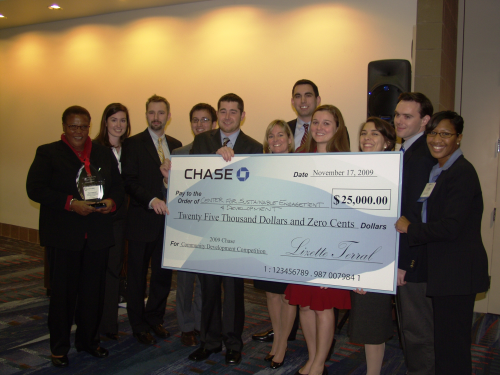Nov 23, 2009
Students’ Winning Urban Development Case Competition Proposal May Help Bring First Grocery Store To New Orleans Ninth Ward
Students’ Winning Urban Development Case Competition Proposal May Help Bring First Grocery Store To New Orleans Ninth Ward
When DePaul University student Ian Kos and his MBA classmates did volunteer work in New Orleans last year, they kept hearing the same plea over and over from residents of the city’s hurricane-ravaged Lower Ninth Ward: We need a grocery store.
That grocery store is a step closer to reality, thanks to an urban development case competition won this fall by Kos, fellow DePaul MBA student Kevin Down, and six teammates from the University New Orleans (UNO) and Louisiana State University (LSU).
The multi-university team captured first place in the 2009 Chase Community Development Competition, which partners college students with New Orleans nonprofit organizations to create practical real estate development concepts that address the real-life needs of low-to-moderate income families in New Orleans. The winning entry proposed redeveloping a vacant building in the Lower Ninth Ward into the community’s first fresh food grocery store. Because the students won, their community partner, Lower Ninth Ward Center for Sustainable Development and Engagement, received the top prize, a $25,000 grant from sponsors Chase and Enterprise Community Partners Inc., which the non-profit organization will use to pursue the grocery store’s development.
Kos, who is studying finance, and Down, a real estate student, devised the financial plan for the proposal, while the UNO students contributed urban planning research and the LSU students created the store’s green, energy-efficient architectural design. Their detailed plan was one of five finalists in the competition, which concluded with a presentation before a judging panel of New Orleans real estate development, architecture and community leaders Nov. 17.
"Developing the financial plan was challenging because of the current economic climate, the lack of a business model for a grocery store in the Ninth Ward, and the fact that the proposed store is 40,000 square feet, smaller than traditional stores that range from 40,000 to 140,000 square feet," said Kos, a resident of Chicago’s Uptown neighborhood. The $4 million plan combined community development tax credits, the involvement of a community lender, owner equity and an incentive offered by the City of New Orleans to encourage development of establishments that sell fresh food.
Down, a resident of Chicago’s Wicker Park neighborhood, said the project provided useful experience for his future career in real estate development, particularly because so much creativity was needed to create a viable financial plan. "I learned a lot about what needs to go into a real estate project and how you need a holistic approach to pull all the pieces together."
Stephen Bell, associate director of DePaul’s Real Estate Center, who helped the students navigate the various steps of the competition, praised them for their hard work. "DePaul’s real estate and finance programs emphasize practical learning, and their diligent work on this proposal gave them a real-life education in real estate development and financing."
The student team and city officials have already talked with a grocery store chain owner from Gary, Ind., who wants to move to New Orleans and is interested being involved in the project, according to Kos. The owner of the proposed site for the store also is interested in backing the project. In addition, the team gathered 19 letters and 260 signatures of support from community members.
"Members of the community attended the final presentations, and they almost started crying when the proposal won," Kos said. "They didn’t have a grocery store even before Hurricane Katrina. This is something they’ve been struggling with for a long time."
Kos became aware of the community’s needs during a service trip he and a group of DePaul MBA students made last year to New Orleans, where they applied their business-school knowledge to the operational problems facing small businesses or start-up ventures that are trying to revitalize the Big Easy’s economy.
With high hopes that his team’s winning plan will come to fruition, Kos said, "I look forward to visiting New Orleans again in the future and seeing the grocery store in reality."
The second place prize of $15,000 was awarded to Broad Community Connections for its design proposal with Massachusetts Institute of Technology and Washington University in St. Louis for a fresh food hub. The third place prize of $10,000 was awarded to the Neighborhood Empowerment Network Association for its resource center design project with the New School (New York). Other competing schools were Tulane University, University of California Davis and University of Oregon.

DePaul MBA students Ian Kos (third from left) and Kevin Down (seventh from left), with teammates from two other universities, won $25,000 for a New Orleans non-profit through their first place proposal to create the first grocery story in New Orleans Ninth Ward in the 2009 Chase Community Development Competition.
